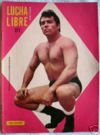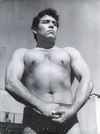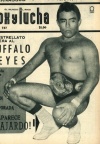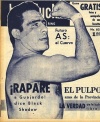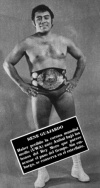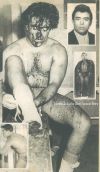René Guajardo: Difference between revisions
m (→Gallery) |
m (→Biography) |
||
| (10 intermediate revisions by 4 users not shown) | |||
| Line 37: | Line 37: | ||
On [[June 22]], [[1967]] he had one of the biggest wins of his lucha career as he defeated [[El Santo]] for the [[National Middleweight Title]]. Defeating Santo in a title match would be big by itself but this was even more important because Santo had held that title for almost FOUR years. Guajardo kept that title during a few months until he lost it on [[March 9]], [[1968]] against [[Alberto Muñoz|Alberto "El Platanito" Muñoz]] (later known as White Man). Guajardo regained the title on [[November 20]], [[1969]], and lost it to never win it back against [[Humberto Garza]] on [[May 13]], [[1970]]. | On [[June 22]], [[1967]] he had one of the biggest wins of his lucha career as he defeated [[El Santo]] for the [[National Middleweight Title]]. Defeating Santo in a title match would be big by itself but this was even more important because Santo had held that title for almost FOUR years. Guajardo kept that title during a few months until he lost it on [[March 9]], [[1968]] against [[Alberto Muñoz|Alberto "El Platanito" Muñoz]] (later known as White Man). Guajardo regained the title on [[November 20]], [[1969]], and lost it to never win it back against [[Humberto Garza]] on [[May 13]], [[1970]]. | ||
Around [[1967]], the Rebeldes team split up in a violent way and both men started a long feud that culminated in their famous [[1968]] singles bout which saw Guajardo emerge victorious. They had already had a split in [[1959]], as they had a short singles feud that ended in a bizarre fashion as on [[March 4]], [[1960]] in a singles match at [[Arena México]], a drunk fan climbed in the ring and knocked both men out with a beer bottle. It's not known if this finish was a work or not, but I'd inclined to think it's a work. | Around [[1967]], the Rebeldes team split up in a violent way and both men started a long feud that culminated in their famous [[1968]] singles bout which saw Guajardo emerge victorious. They had already had a split in [[1959]], as they had a short singles feud that ended in a bizarre fashion as on [[March 4]], [[1960]] in a singles match at [[Arena México]], a drunk fan climbed in the ring and knocked both men out with a beer bottle. It's not known if this finish was a work or not, but I'd be inclined to think it's a work. | ||
When the famous EMLL split came in [[1974]], Guajardo and his good friends Mendoza and Lagarde had an instrumental part on it and the three men were key players in the newly formed [[UWA]]. On [[November 26]], [[1975]] he became the first ever [[UWA World Middleweight Championship|UWA World Middleweight champion]] by defeating Anibal in Mexico City in a match for the vacant strap. He would later lose ([[May 2]], [[1976]]) and regain ([[October 31]], [[1976]]) the title to [[Gran Hamada]], and finally lose it again ([[October 2]], [[1977]]) to Anibal. All those title changes happened in Monterrey. And this fact has got an explanation. | When the famous EMLL split came in [[1974]], Guajardo and his good friends Mendoza and Lagarde had an instrumental part on it and the three men were key players in the newly formed [[UWA]]. On [[November 26]], [[1975]] he became the first ever [[UWA World Middleweight Championship|UWA World Middleweight champion]] by defeating Anibal in Mexico City in a match for the vacant strap. He would later lose ([[May 2]], [[1976]]) and regain ([[October 31]], [[1976]]) the title to [[Gran Hamada]], and finally lose it again ([[October 2]], [[1977]]) to Anibal. All those title changes happened in Monterrey. And this fact has got an explanation. | ||
Since he broke up his relationship with EMLL, Guajardo had been promoting "La Division del Norte" (Northern Division), using independent talent to promote shows on the North of Mexico and having Monterrey, Nuevo Leon as his home base. His promotion was highly successful and part of it was because it featured a lot of ringside brawling and some of the wrestlers used bottles, chairs and illegal objects to "spice up" the matches. Guajardo also gave a few extra bucks to the uniformed members of the security team so they would let themselves get pound by some of the wrestlers. This controversial spectacle, and the use of big stars on top, made him a much richer man in a matter of months. This promotion also gave his first break to wrestlers like [[Canek]] and [[Blue Panther]]. | Since he broke up his relationship with EMLL, Guajardo had been promoting "La Division del Norte" (Northern Division), using independent talent to promote shows on the North of Mexico and having Monterrey, Nuevo Leon as his home base. His promotion was highly successful and part of it was because it featured a lot of ringside brawling and some of the wrestlers used bottles, chairs and illegal objects to "spice up" the matches. Guajardo also gave a few extra bucks to the uniformed members of the security team so they would let themselves get pound by some of the wrestlers. This controversial spectacle, and the use of big stars on top, made him a much richer man in a matter of months. This promotion also gave his first break to wrestlers like [[Canek]] and [[Blue Panther]]. | ||
Other than the different titles he got throughout his career, some of René's accomplishments were receiving the wrestler of the year award in [[1962]], [[1965]] and [[1975]]; tag team of the year with Lagarde in [[1963]] and [[1965]] (among others); participating in two [[Jorge Rivero]] directed [[1964]] films ("Los Endemoniados del Ring" -The demoniac men of the ring- and "La Mano que Aprieta" -The squeezing hand-); having the honor of wrestling against (and losing to) the dream team of [[Lou Thesz]] & [[Black Shadow]] in 1965 (teaming with Benny Galán); wrestling all over South America; winning the mask of [[Halcón de Oro]] (José Fita) and the scalps of several legends like Ray Mendoza, Black Shadow, [[Felipe Ham Lee]], [[Chino Chow]], [[Yamamoto]] and [[Perro Aguayo]]. | Other than the different titles he got throughout his career, some of René's accomplishments were receiving the wrestler of the year award in [[1962]], [[1965]] and [[1975]]; tag team of the year with Lagarde in [[1963]] and [[1965]] (among others); participating in two [[Jorge Rivero]] directed [[1964]] films ("Los Endemoniados del Ring" -The demoniac men of the ring- and "La Mano que Aprieta" -The squeezing hand-); having the honor of wrestling against (and losing to) the dream team of [[Lou Thesz]] & [[Black Shadow]] in 1965 (teaming with Benny Galán); wrestling all over South America; winning the mask of [[Halcón de Oro]] (José Fita) and the scalps of several legends like Ray Mendoza, Black Shadow, [[Felipe Ham Lee]], [[Chino Chow]], [[Yamamoto]] and [[Perro Aguayo]]. | ||
René Guajardo kept working in the promotional end of lucha libre until his death, as a result of complications resulting from liver cancer, on [[May 11]], [[1992]].</font> | René Guajardo kept working in the promotional end of lucha libre until his death, as a result of complications resulting from liver cancer, on [[May 11]], [[1992]].</font> | ||
<br clear=all> | <br clear=all> | ||
| Line 57: | Line 56: | ||
{{aline|65/08/20<ref>Lucha Libre 97</ref>|hair|[[René Guajardo]]|[[Ray Mendoza]]|[[Arena México - Mexico City]]}} | {{aline|65/08/20<ref>Lucha Libre 97</ref>|hair|[[René Guajardo]]|[[Ray Mendoza]]|[[Arena México - Mexico City]]}} | ||
{{aline|66/[[September 9|09/09]]|hair|[[René Guajardo]]|[[Felipe Ham Lee]]|Arena México - Mexico City}} | {{aline|66/[[September 9|09/09]]|hair|[[René Guajardo]]|[[Felipe Ham Lee]]|Arena México - Mexico City}} | ||
{{aline|[[1966|66]]/[[September 30|09/30]]|hair|[[René Guajardo]]|[[Jerry London]]|[[Arena México]] - [[Mexico City]]}} | |||
{{aline|[[1968|68]]/[[March 15|03/15]]|mask|[[René Guajardo]]|[[Halcón de Oro I]]|[[Arena México]] - [[Mexico City]]}} | {{aline|[[1968|68]]/[[March 15|03/15]]|mask|[[René Guajardo]]|[[Halcón de Oro I]]|[[Arena México]] - [[Mexico City]]}} | ||
{{aline|[[1968|68]]/[[08/10]]|hair|[[El Santo]]|[[René Guajardo]]|unknown}} | {{aline|[[1968|68]]/[[08/10]]|hair|[[El Santo]]|[[René Guajardo]]|unknown}} | ||
| Line 67: | Line 67: | ||
{{aline|75/07/26|hair|[[Gran Hamada]]|[[René Guajardo]]|Plaza México - Mexico City}} | {{aline|75/07/26|hair|[[Gran Hamada]]|[[René Guajardo]]|Plaza México - Mexico City}} | ||
{{aline|80/06/29|hair|[[René Guajardo]]|[[Perro Aguayo]]|Palacio de los Deportes - Mexico City}} | {{aline|80/06/29|hair|[[René Guajardo]]|[[Perro Aguayo]]|Palacio de los Deportes - Mexico City}} | ||
{{aline|[[1981]]/[[11/22]]|hair<ref>[https://m.facebook.com/story.php?story_fbid=10156147011281559&id=96186896558 Revista Box y Lucha]</ref>|[[Rene Guajardo]]|[[Frankenstein (1st masked version)|Frankenstein]]|[[Plaza de Toros Monumental]] - [[Monterrey]], [[Nuevo León]]}} | |||
{{aend|}} | {{aend|}} | ||
| Line 72: | Line 73: | ||
{{Gallery|name=8e65 1.jpg|caption=Rev Lucha Libre 1969}} | {{Gallery|name=8e65 1.jpg|caption=Rev Lucha Libre 1969}} | ||
{{Gallery|name=Rene01.jpg|caption=El Rey Moro, posing in 1969}} | {{Gallery|name=Rene01.jpg|caption=El Rey Moro, posing in 1969}} | ||
{{Gallery|name=nwalh_reneguajardo.jpg|caption=6 | {{Gallery|name=nwalh_reneguajardo.jpg|caption=6 Times [[NWA World Middleweight Championship]]}} | ||
{{Gallery|name=Guajardo.jpg|caption=}} | {{Gallery|name=Guajardo.jpg|caption=}} | ||
{{Gallery|Guajardo-uwa-middle-2nd.jpg|caption=}} | {{Gallery|name=Guajardo-uwa-middle-2nd.jpg|caption=}} | ||
{{Gallery|name=296138248_2577303075733864_8540638316971690126_n.jpg|caption=}} | |||
<br clear=all> | |||
{{Gallery|name=renenwa.png|caption=}} | |||
<!-- Copy all categories that fit --> | <!-- Copy all categories that fit --> | ||
Latest revision as of 17:50, 31 July 2023
Profile
| René Guajardo | |||||||||||||||||||||||||||||
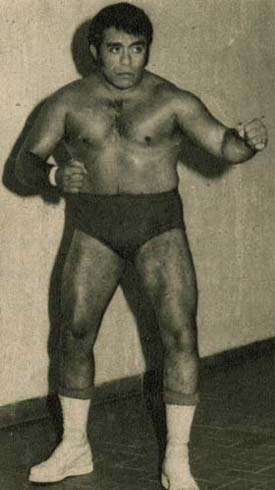 |
|
||||||||||||||||||||||||||||
| Wrestling Observer Hall Of Fame Member |
|---|
Biography
Manuel Guajardo Mejorado was born on January 4, 1933 in Villa Mainero, Tamaulipas. When he was 13 years old he attended his first lucha card and he was so impressed and became such a big fan that three years later he joined a gym in Monterrey to get some basic training with a local wrestler called Chema López, however the man that gave him the bulk of his training was Rolando Vera.
René made his debut on 1954 against Oso Negro. Hard work, determination, and Rolando's good word about the young luchador provided him a spot with EMLL and he debuted in Arena Coliseo on October 8 of that same year against Mishima Ota.
During his first three years in the business he wrestled as a técnico, but in 1957 he saw Karloff Lagarde in Monterrey and started to wonder if he'd do better as a rudo/heel, as he saw that as a técnico his career wasn't advancing even though he was considered a future big star by the media and the fans (he was voted Rookie of the year in 1955).
Soon thereafter, René and Karloff became good friends. Lagarde already was an stablished main event star and holder of the National Welterweight Title. Back then, most lucha main events were tag team matches, and he knew he'd do better with a regular team partner. He saw all the raw talent in the young man so he proposed him to form a team, and of course, Guajardo accepted. That was René's ticket to stardom, as he moved to the big time matches in a matter of weeks.
Now he had to give proof that he had what it takes to be a main event performer and he wasn't just another overpushed wrestler. He lived up to that position, as his violent and energic style made him one of the most hated wrestlers in Mexico. He was known as "un rudo con recursos" (a heel with -technical- resources) and the magazines would always emphasize that unlike other rudos, he had a very scientific array of holds.
Guajardo's consecration as a main eventer in the world of lucha libre was on October 13, 1960 when he defeated his mentor Rolando Vera in a match for the NWA World Middleweight Title. During the next 13 years he held that belt five more times, switching it with people like Antonio Posa, Rayo de Jalisco, Aníbal and Jerry London, though probably the most bitter of all the title loses was the one he had on March 11, 1967 against Ray Mendoza in Mexico City.
During the 60s, Mendoza, Lagarde and Guajardo formed an association both inside and outside the ring. In the ring they were top wrestlers. Out of it, they were top negotiators. The Lutteroths always were known as ambitious and avaricious businessmen, but the pressure the wrestlers (commanded by Ray, René and Karloff) put on them improved the conditions of work at La Empresa.
Lagarde and Guajardo's team, now known as "Los Rebeldes" (The Rebels - an allusion to the "Rebel without a cause" film that was so popular back in the day), became National Tag Team champions in 1962. All three men would team with each other though, so when it was Lagarde and Mendoza teaming, Guajardo would align himself with people like Rolando Vera or Benny Galán.
On June 22, 1967 he had one of the biggest wins of his lucha career as he defeated El Santo for the National Middleweight Title. Defeating Santo in a title match would be big by itself but this was even more important because Santo had held that title for almost FOUR years. Guajardo kept that title during a few months until he lost it on March 9, 1968 against Alberto "El Platanito" Muñoz (later known as White Man). Guajardo regained the title on November 20, 1969, and lost it to never win it back against Humberto Garza on May 13, 1970.
Around 1967, the Rebeldes team split up in a violent way and both men started a long feud that culminated in their famous 1968 singles bout which saw Guajardo emerge victorious. They had already had a split in 1959, as they had a short singles feud that ended in a bizarre fashion as on March 4, 1960 in a singles match at Arena México, a drunk fan climbed in the ring and knocked both men out with a beer bottle. It's not known if this finish was a work or not, but I'd be inclined to think it's a work.
When the famous EMLL split came in 1974, Guajardo and his good friends Mendoza and Lagarde had an instrumental part on it and the three men were key players in the newly formed UWA. On November 26, 1975 he became the first ever UWA World Middleweight champion by defeating Anibal in Mexico City in a match for the vacant strap. He would later lose (May 2, 1976) and regain (October 31, 1976) the title to Gran Hamada, and finally lose it again (October 2, 1977) to Anibal. All those title changes happened in Monterrey. And this fact has got an explanation.
Since he broke up his relationship with EMLL, Guajardo had been promoting "La Division del Norte" (Northern Division), using independent talent to promote shows on the North of Mexico and having Monterrey, Nuevo Leon as his home base. His promotion was highly successful and part of it was because it featured a lot of ringside brawling and some of the wrestlers used bottles, chairs and illegal objects to "spice up" the matches. Guajardo also gave a few extra bucks to the uniformed members of the security team so they would let themselves get pound by some of the wrestlers. This controversial spectacle, and the use of big stars on top, made him a much richer man in a matter of months. This promotion also gave his first break to wrestlers like Canek and Blue Panther.
Other than the different titles he got throughout his career, some of René's accomplishments were receiving the wrestler of the year award in 1962, 1965 and 1975; tag team of the year with Lagarde in 1963 and 1965 (among others); participating in two Jorge Rivero directed 1964 films ("Los Endemoniados del Ring" -The demoniac men of the ring- and "La Mano que Aprieta" -The squeezing hand-); having the honor of wrestling against (and losing to) the dream team of Lou Thesz & Black Shadow in 1965 (teaming with Benny Galán); wrestling all over South America; winning the mask of Halcón de Oro (José Fita) and the scalps of several legends like Ray Mendoza, Black Shadow, Felipe Ham Lee, Chino Chow, Yamamoto and Perro Aguayo.
René Guajardo kept working in the promotional end of lucha libre until his death, as a result of complications resulting from liver cancer, on May 11, 1992.
Luchas de apuestas record
- ↑ Lucha Libre 97
- ↑ Box Y Lucha
- ↑ Revista Box y Lucha
Gallery
